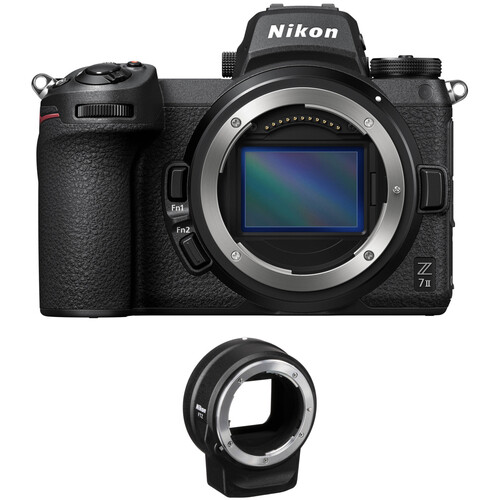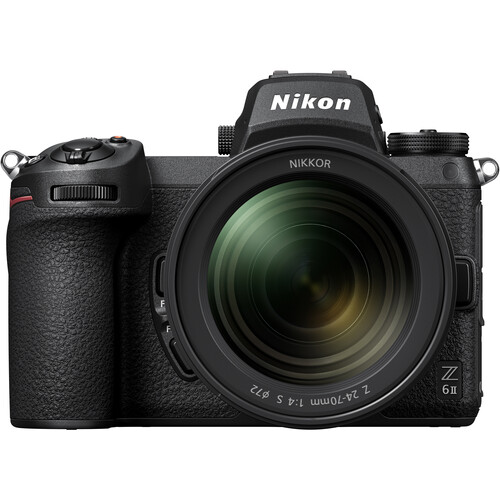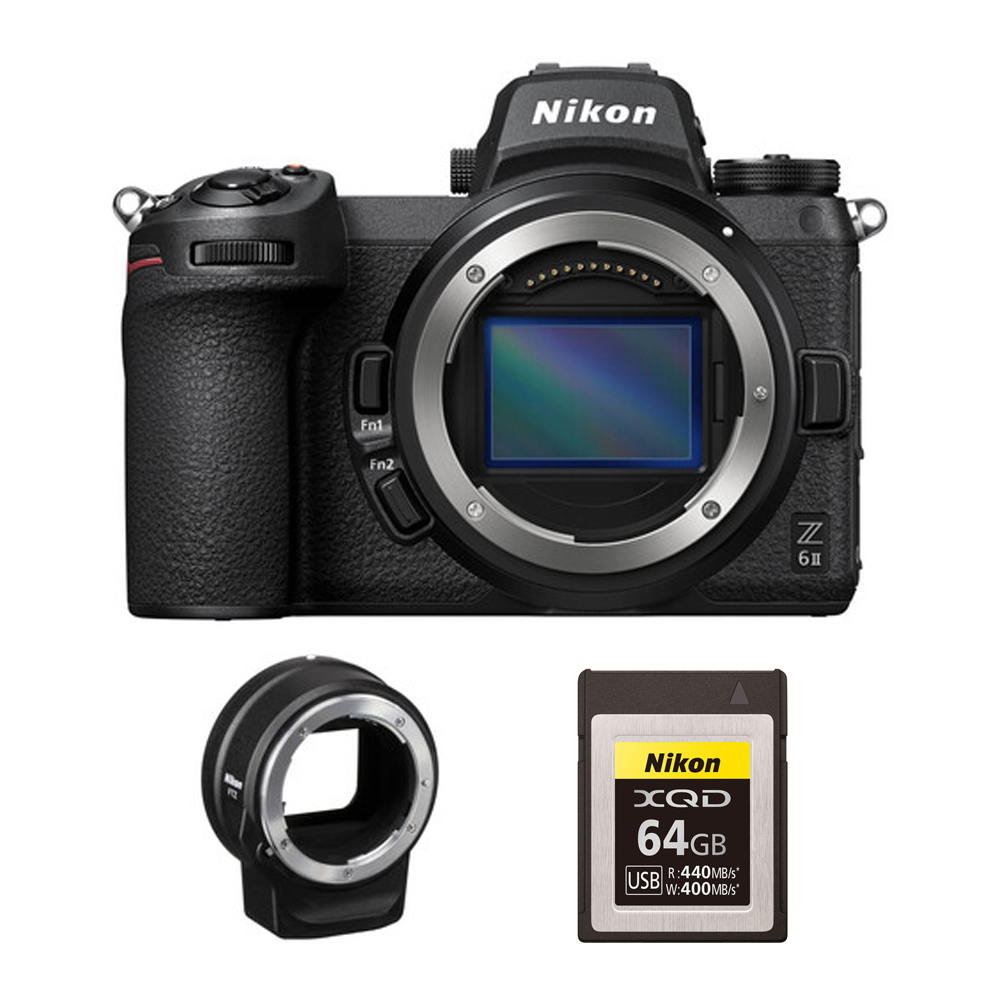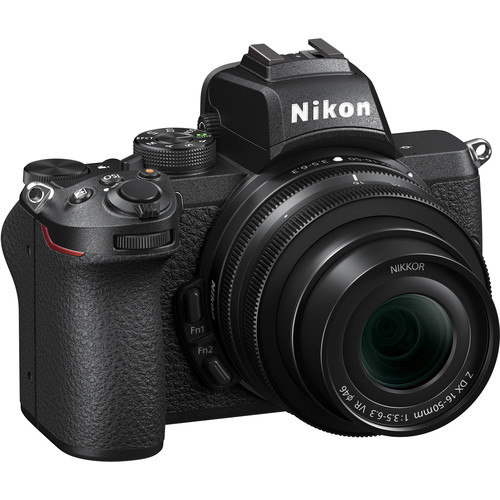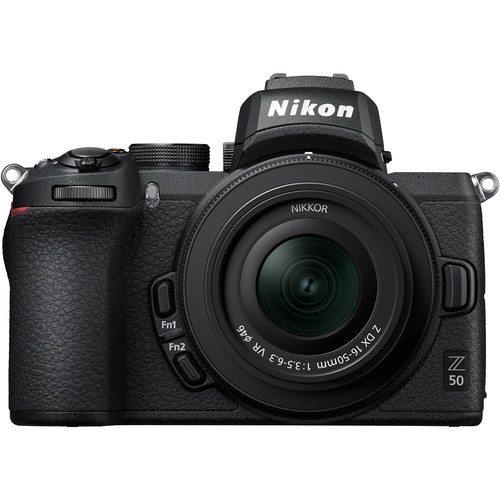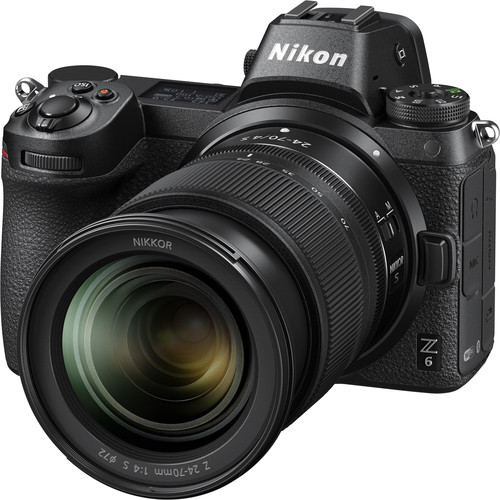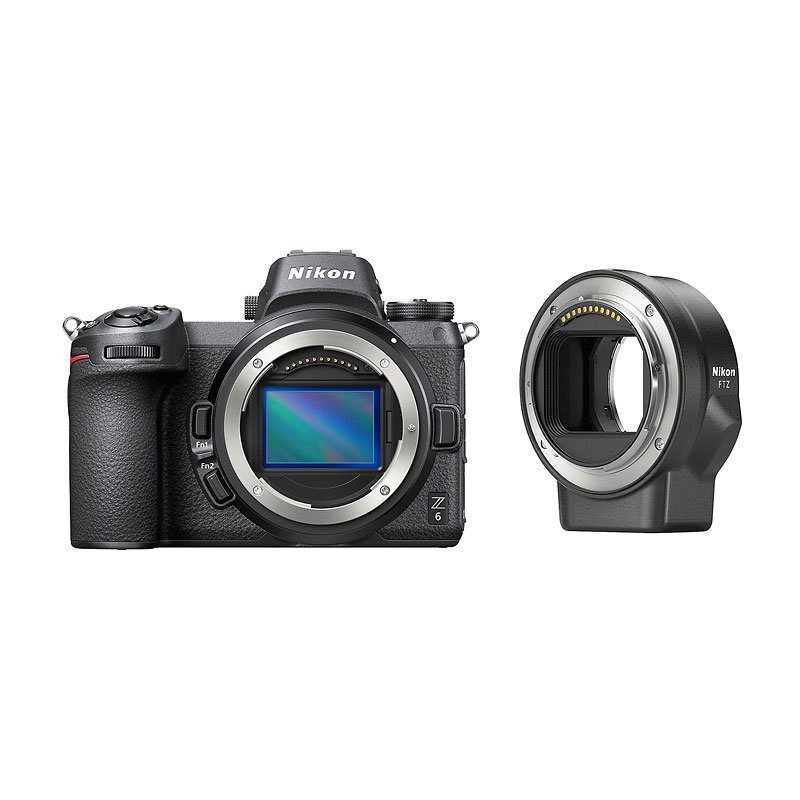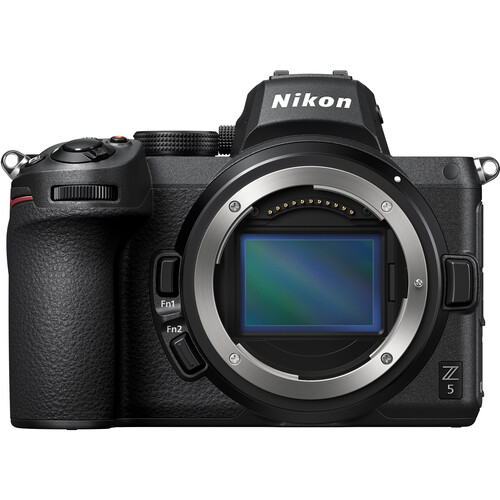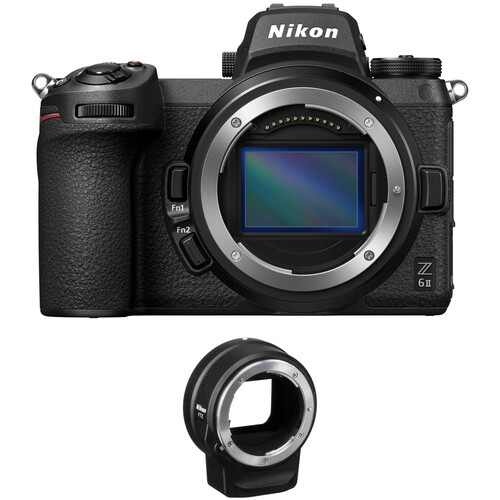
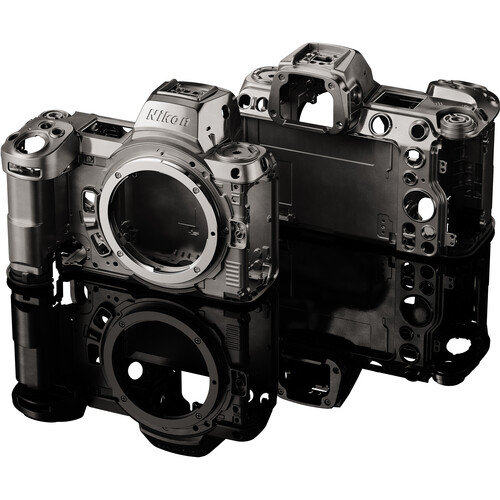
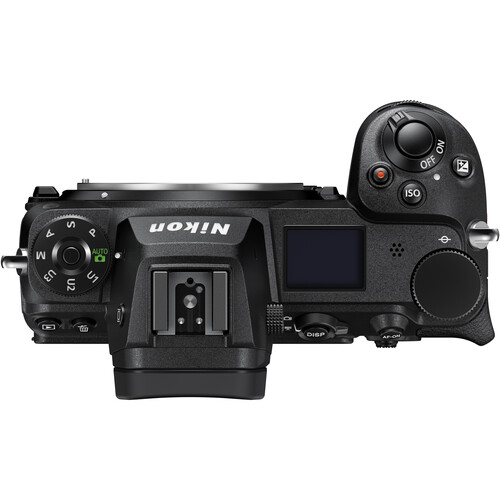
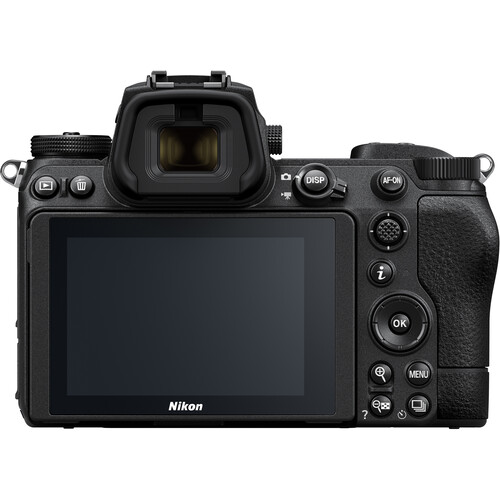




Nikon Z 6II Mirrorless Digital Camera Body with FTZ IIAdapter Kit
Cameras
Key Features
- 24.5MP FX-Format BSI CMOS Sensor
- Dual EXPEED 6 Image Processors
- UHD 4K30 Video; N-Log & 10-Bit HDMI Out
- 14 fps Cont. Shooting, ISO 100-51200
Overview
More speed, more versatility, more performance, the Nikon Z 6II is an updated take on the all-rounder mirrorless camera designed for high-end photo and video applications. Despite the wealth of upgrades, the Z 6II retains its familiar form factor and prized image quality to benefit working multimedia image-makers.
Revolving around a 24.5MP BSI CMOS sensor and dual EXPEED 6 image processors, the Z 6II is characterized by an increased buffer depth and faster continuous shooting rate, up to 14 fps with single-point AF or 12 fps shooting in other focusing modes. Video recording at UHD 4K 30p is possible, or up to FHD 120p for slow-motion output, and external recording gains 10-bit out along with N-Log and HLG (HDR) support. The sensor also suits working in a variety of lighting conditions, with sensitivity from ISO 100-51200, and in-body 5-axis Vibration Reduction reduces the appearance of camera shake for sharper handheld shooting. Additionally, the sensor also incorporates a 273-point phase-detection AF system, which now supports Eye-Detect AF in Wide-Area AF modes and during movie recording, and permits focusing in low-light down to -4.5 EV.
Balancing the imaging, the Z 6II retains its overall physical design, however it has been updated with a new dual memory card slot interface to hold one CFexpress Type B card and one SD UHS-II card for more flexible storage. Both a high-res 3.6m-dot OLED EVF and rear 3.2" 2.1m-dot tilting touchscreen LCD lend versatility to image composition and playback, and SnapBridge wireless connectivity can be used for remote camera control, image sharing to a mobile device, and even over-the-air firmware updates.
Second Generation Z
Improving upon their initial efforts, Nikon has revised the Z 6 platform to offer more speed, faster processing, and greater versatility without sacrificing the beloved qualities of the original camera.
- Dual EXPEED 6 image processors offer increased buffer performance, a faster 14 fps continuous shooting rate, and noticeably reduced blackout times in the viewfinder.
- Updated autofocus now includes Eye and Face Detection for both humans and animals in the Wide-Area AF mode, for both photo and video recording.
- Timed long exposure shooting is now possible for up to 900 seconds (15 minutes) without the need of an external remote.
- Dual memory card slots offer more flexible file storage capabilities; one CFexpress Type B and one SD UHS-II slot permit overflow, segregated, and repetitive saving options.
- USB Type-C port permits in-camera charging or continuous power for on-the-go charging or extended shooting times.
- The rotation direction of the focus ring on lenses can be switched to suit one's familiarity.
- Support for HDR (HLG) mode when recording externally gives instant HDR-suitable video files for immediate playback. N-Log is also available for enhanced control during post-production and grading, too.
- Future firmware update will add UHD 4K 60p recording, in addition to the current 30p frame rate.
- Eligible for an optional ProRes RAW upgrade, enabling the camera to output ProRes RAW footage to a compatible Atomos external recorder. This upgrade provides greater color grading flexibility with the ProRes codec along with the ability to output uncompressed 12-bit raw footage over HDMI. This upgrade will be available in early 2021.
- The SnapBridge wireless connectivity can be used to update the camera's firmware, instead of relying on a memory card-based system of updating.
- Updated creative shooting modes include Multiple Exposure, 20 different Picture Control settings, and in-camera Timelapse recording. There is also a Focus Shift mode for recording up to 300 sequential frames with the focus position shifted between exposures for focus stacking applications.
- Compatible with optional MB-N11 Power Battery Pack for additional battery life and improved handling.
24.5MP FX-Format BSI CMOS Sensor and Dual EXPEED 6 Processors
A 24.5MP BSI CMOS sensor is used for all-around shooting, impressive low-light quality, and fast readout speeds to benefit continuous shooting, movies, and time-lapse recording. The back-illuminated design of the sensor affords noticeably clean high-sensitivity output for reduced noise when working at high ISO values, up to a native ISO 51200, as well as vivid and smooth quality at sensitivities as low as ISO 100. Benefitting the sensor are dual EXPEED 6 image processors, which affords a wealth of speed throughout the camera system, including the ability to shoot continuously at 14 fps for up to 124 consecutive frames.
UHD 4K Video Recording
Utilizing the sensor and processor attributes for more than just still imagery, the Z 6II is also a more-than-capable multimedia camera. UHD 4K video recording is possible with full pixel readout up to 30p and Full HD 1080p video recording is also supported at up to 120p for slow motion playback. Video files can be saved to the in-camera memory cards or as an uncompressed file to an optional external recorder via HDMI out.
Advanced video functionalities have been added with the Z 6II, including the N-Log gamma for capturing flat-looking footage that maximizes dynamic range and HLG (HDR) for recording HDR-ready footage. Other additions are the ability to output high-quality 10-bit data over HDMI and an Electronic VR function for smooth handheld shooting. Focus Peaking can be used to benefit manual focus control and a Zebra Stripes option is also available to help detect over-exposed areas within the frame. Audio recording can be handled using the built-in stereo microphone or an optional external mic can be added via the 3.5mm stereo jack for greater control over quality, and live monitoring is possible via the headphone jack.
273-Point Phase-Detect AF System
Located on the sensor is an array of 273 phase-detect autofocus points covering 90% of the image area both vertically and horizontally. This provides fast and accurate focusing for both stills and video and with a wide coverage area, subject tracking will work out to near the edges of the frame. Hybrid AF is available for video, which will automatically switch between phase- and contrast-detect systems to provide smooth focus during shooting. Additionally, the latest NIKKOR Z lenses are optimized for silent operation.
Vibration Reduction
In-body 5-axis sensor-shift Vibration Reduction compensates for up to 5 stops of camera shake regardless of the Z-type lens being used. This system also works with adapted F-mount lenses, when using the optional FTZ Adapter, where 3-axis stabilization is used.
Body Design
- A large 3.2" 2.1m-dot LCD screen is available for bright, clear, and vivid image playback and live view shooting. The screen has a tilting design to benefit working from both high and low angles, and it is also a touchscreen for more intuitive operation, navigation, and settings control.
- A 3.6m-dot OLED electronic finder is present for comfortable eye-level viewing. It has a high 0.80x magnification and uses NIKKOR optics to guarantee a sharp, clear image. The finder also has a fluorine coating for easier cleaning.
- The top panel of the Z 6II is configured with a dot-matrix OLED. This low-energy display provides quick access to important camera settings.
- Configured with one CFexpress Type B/XQD memory card slot and one UHS-II SD card slot, flexible file storage is possible with the option to use repetitive, overflow, or segregated storage methods.
- A robust magnesium alloy chassis is both dust- and weather-resistant to benefit working in harsh climates and inclement conditions.
- The ergonomic grip and overall form factor is shaped to benefit handling for extended periods of time and is further accentuated by an anti-slip material and a joystick for seamless settings and focus point selection.
- Built-in SnapBridge connectivity to enable seamless transfer of low-resolution imagery as well as remote shooting capabilities. BLE (Bluetooth Low Energy) and Wi-Fi enables communication between the camera and a smart device and, additionally, the mobile device can remotely trigger the shutter and display a live view image from the camera to enable working from a distance. Additionally, SnapBridge can also be used as an easier method of updating the camera's firmware.


